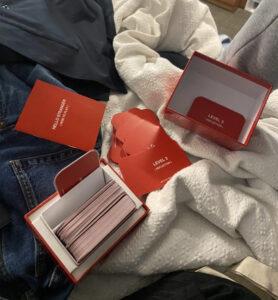Critical Play 3: We’re Not Really Strangers
I played a getting vulnerable game called We’re Not Really Strangers with my really close friend.

WNRS has multiple types of fun including fellowship, discovery, and expression. I think there is a good balance of all three fun elements in this game, but after playing it with my really close friend, I think the percentage of each type of fun will vary between who you play it with. For example, I played it with my really close friend, so there wasn’t a lot of discovery that we did since I understand and know my friend really well and he knows me really well as well.
I like how the game has certain mechanics that reinforced the fun elements. For example, we got to a question where both me and my friend had to name the first time that we felt genuine joy in our life and he said it was his 12th birthday, and further said that he could not remember anything before 12 years old. I thought he wasn’t thinking hard enough because he definitely had memories prior to being 12 years old, so I used the “dig deeper” card on him and made him think harder, so he thought about it more and talked about how his grandfather took him to buy toys and told him to just let his parents know afterwards instead of asking them whether he can buy the toy or not. This specific mechanic reinforced both discovery and fellowship. My friend never talked about his grandfather on his mother side, so I discovered something new about his family as we went on and talked more about his grandfather. It also made me feel a stronger sense of fellowship since it made me think of my grandfather so I talked about a memory with him as my earliest joyful moments as well. This example perfectly shows how a specific mechanism in the game can prompt all levels of players (in this case close friends in WNRS since it’s harder for them to feel discovery) to feel the different types of fun the game wants to evoke.
Another specific mechanic in the game that I really liked which also differentiates it from other games in this genre is the final card. The final card really reinforces all 3 types of fun and especially expression. I think for most games in this genre like Truth or Dare, you don’t really leave the game with any physical element or concrete connection to keep. However, I really like how players will write each other notes for them to keep for the last card. This leaves players with a much stronger bond and a more vivid memory of the game.
Something I think this game can improve on is the wild cards. I like a lot of the wild cards, and I think this game can go a bit further on this idea by giving the players more power and control over questions. For example, there can be some wild cards that are blank and let the players come up with questions themselves (I’m not sure if WNRS already has it or not but I didn’t see it). This can enhance fellowship and discovery more because close friends can start coming up with specific questions that target towards each other’s niche interests. I also think something this game can do better is perhaps having a skip card that each player can use once per level (like how the dig deeper card works) since right now we only have a card that prompts people to get more vulnerable, but there isn’t a card to let people feel less vulnerable if they feel uncomfortable opening up.
All in all, I would say you can get really vulnerable in this game, but at the end of the day it really depends on each player and how vulnerable they are willing to get. There isn’t really a punishment mechanism in this game which I honestly like a lot since it can be hard to play getting vulnerable games, and if there is a harsh or not-well enforced punishment mechanism, then it might add pressure to a lot of people which might lead to adverse effects like them lying. This is also one other thing that differentiates WNRS from other types of getting vulnerable games since most other games are more like “competition” games in which there are punishment enforced, but WNRS is more chill and wholesome in a sense that players are getting vulnerable because they are actually learning about the other players and themselves and making connections rather than other games in which sometimes the getting vulnerable part is being utilized to get laughed at or being judged. Therefore, I would say this game is really intimate because people will open up and share their innermost feelings, but I also like how the game gives the players a lot of space to do whatever they want.



